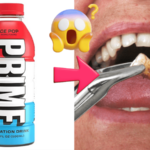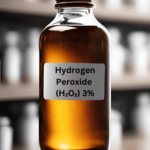We’ve all dealt with them. Everyone has dealt with pesky oral health issues that can make our day-to-day lives less than pleasant. Even as someone who comes from a dental profession, I get annoyed having to deal with them. From bad breath to canker sores, these problems can be both uncomfortable and embarrassing. Oral health issues can significantly impact our quality of life. As such, I was interested in looking at four most annoying common oral health issues: 1) bad breath (halitosis), 2) sensitive teeth, 3) “tooth pain” headache, and 4) canker sores (aphthous ulcers).

Bad Breath (Halitosis)
This one is especially embarrassing. We’ve all had bad breath before but it’s the absolute worst when you have to go to an important meeting or on a date with a special someone. Bad breath, also known as halitosis, can have many causes related to oral health. Some of the main causes are poor oral hygiene habits, gum disease, and dry mouth.
To help prevent bad breath, it’s important to have good habits. It is especially crucial to do the following regularly:
- Brush and floss regularly: Brush your teeth twice a day for at least 2-3 minutes. Floss at least once daily to remove food debris from between your teeth.
- Scrape your tongue: Bacteria can accumulate on your tongue, contributing to bad breath. Use a tongue scraper to remove these bacteria.
- Consider a mouthwash: A mouthwash can help kill bacteria and freshen your breath.
- Stay hydrated: Dehydration can lead to dry mouth, which can contribute to bad breath.
- Limit sugary and starchy foods: These foods can contribute to bacterial growth.

Sensitive Teeth
We’ve all dealt with this before. That sharp pain in your teeth when trying to drink an ice-cold beverage. Tooth sensitivity generally occurs when the underlying layer of your teeth, the dentin becomes exposed. This can happen due to many reasons, including but not limited to erosion of the enamel, gum recession, cracked teeth, use of teeth whitening products, and even just brushing too hard.
For the most part, tooth sensitivity can go away on its own but it’s good to go see a dentist to check if there are any exposed teeth roots or more significant issues. If teeth sensitivity is caused by normal wear and tear, try doing the following to improve symptoms.
- Maintain good oral hygiene: Having good habits of cleaning your teeth can help protect the enamel to reduce tooth sensitivity
- Use a toothpaste for sensitive teeth: These toothpastes contain ingredients (usually sodium fluoride or stannous fluoride) that can help soothe sensitive teeth.
- Use a soft-bristled toothbrush: Using a toothbrush with soft bristles will reduce the abrasion of the enamel.
- Avoid acidic foods and drinks: Acids can erode the enamel on your teeth, making them more sensitive.
- Consider a mouthguard: If you grind your teeth at night, a mouthguard can help protect your teeth from excessive wear and tear.

Headaches from Tooth Pain
This is an unusual one that I’ve seen with patients, but bad headaches do sometimes come with tooth pain. We’ll call this the “Tooth Pain” headache.
The source of the headache starts and ends with the trigeminal nerve, which is the largest cranial nerve in the body. It connects the brain and brain stem to the face. This nerve is responsible for all the sensations in the face, including the teeth and gums.
When you have a toothache, the trigeminal nerve can become irritated and trigger a migraine headache. Other accompanying reactions to toothaches, such as muscle clenching and jaw tightening, can also lead to tooth pain headaches.
To resolve this particular issue, try doing the following:
- Take over-the-counter pain relievers: Pain medications such as ibuprofen could offer temporary relief.
- Go see a dentist: If the headache is coming from a cracked tooth or cavities, you will have to resolve the source problem. Go to the dentist as soon as possible to address the underlying dental issues.

Canker Sores
This particular oral infection definitely is among the more painful and uncomfortable experiences you can have when dealing with oral health issues. Canker sores, also called aphthous ulcers, are small, shallow lesions that develop on the soft tissues in your mouth or at the base of your gums. They can be very painful and can make eating and talking difficult. There are several reasons why canker sores occur, some of which include emotional stress, viral infections, trauma in the mouth, dietary deficiencies, and immune system problems. Personally, I’ve accidentally bitten myself while chewing my food, leading to 2 weeks of extreme discomfort.
Most canker sores go away on their own in a week or two, but go to your dentist or doctor if the problems persist. They could be indications of other, more significant oral health issues. If you are currently dealing with canker sores, you can try some of following to relieve the pain:
- Avoid irritants: Certain foods and drinks, like acidic fruits and spicy foods, can irritate canker sores.
- Use a numbing gel or mouthwash: These can provide temporary relief from pain and discomfort.
- Apply ice to the sore: Cold temperatures can help reduce inflammation, which can make the sore feel less painful and swollen
- Try warm saltwater rinses: Warm saltwater can help remove bacteria and debris from the area, helping to create a favorable environment for the canker sore to heal and prevent further infection.
- Maintain good oral hygiene: Brushing and flossing regularly can help prevent canker sores and promote healing.
- Consider over-the-counter medications: Pain relief gels and creams can help reduce inflammation and promote healing. In addition, they also contain antibacterial formulations to help prevent further infections.

Becoming Oral Disease Free for a Better Smile Tomorrow
Remember, prevention is key when it comes to oral health. By following these tips and seeing your dentist regularly, you can help keep your mouth healthy and free from annoying problems.
Check Out Our Other Blogs
Did you enjoy our article? We have more great content (links below)!
- Dental Science In Focus: Top Vitamins and Minerals for Oral Health
- Dental Science In Focus: Prebiotics and Probiotics for Oral Health
- Flossing Properly Matters For Oral Health and Your Smile
- Medium: What It Means To Be A Tooth Engineer
- Dental Science Experiments: Hydrochloric Acid and Teeth
- Hydrogen Peroxide Teeth Experiment: Be Careful With Whitening
- Be Wary of PRIME… It Could Ruin Your Teeth
- Unveiling the Truth: Debunking Myths about Fluoride
Follow Us!
If you liked this article, then please subscribe to our YouTube Channel and Medium Blog for more Tooth Engineers content. You can also find us on Instagram and Facebook.




